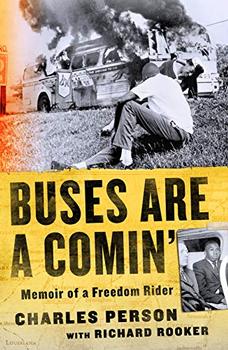Summary | Excerpt | Reading Guide | Reviews | Beyond the Book | Readalikes | Genres & Themes | Author Bio

Memoir of a Freedom Rider
by Charles Person, Richard Rooker
Customers tipped us when they were done for the evening by sliding coins—nickels, dimes, quarters—down the alley. We'd rush and gather up whatever they sent our way with the enthusiasm of a child waking up to snow in Atlanta. Tips at Briarcliff were far more common than Southern snow, but every time those coins headed our way, they might as well have been the first flakes of winter.
My days as a pinboy at Briarcliff brought two youthful awakenings to me. The first was one that occurs in the life of almost every American child. The older boys informed me—that would be putting it kindly—there was no Santa Claus. No Santa Claus? I could not believe it. It may be hard to comprehend that at twelve I still believed in Santa, but I did. Their "informing" me came as mockery and belittling. They could not believe I still believed.
"Mouse believes in San-ta. Mouse believes in San-ta," they would taunt.
"Hey, Mouse, just because the Easter Bunny is real, doesn't mean everything is," they teased.
"Mouse, how can someone as smart as you be as dumb as that," they needled.
I went home and cried my eyes out. I implored Mom to tell me it wasn't so. She didn't.
Discovering the truth about Santa is part of life. Seems like almost everybody, in America at least, goes through that awakening. Santa is part of our culture.
The other awakening I experienced working at Briarcliff was a truth that happened only to Negroes. Down South, it was as much a part of the culture as Santa Claus.
One day, the other pinboys and I stepped out to get dinner on our break. Most days I ate a bologna-and-cheese sandwich Mom had made for me. The first time Mom did not make me a sandwich, Flu and Charles led me next door to the Majestic diner. We walked under its red neon lights proclaiming FOOD TO TAKE HOME, past a wall of glass bricks making it impossible to see inside, till we reached the cutaway corner creating the entrance of the restaurant. Above us a giant, horizontal line of bright red letters spelling MAJESTIC curved around the building. Above them, a glowing vertical sign proclaimed FOOD THAT PLEASES. That place sucked you in with illumination and glitz. Today, the bowling alley is long gone, but you can still sit down for a meal at the Majestic. I learned that night I could not.
We entered. Inside, a long, narrow aisle separated a seemingly endless counter from a row of four-person booths that also stretched as far as twelve-year-old eyes could see. The place was abuzz with business. With every stool occupied, I headed for one of the booths.
"What are you doing?" said Flu.
I looked at him. "What do you mean?"
"We can't eat here."
"Why?" I didn't have a clue.
"We can't eat here. Negroes can't eat here. Don't you know that?"
It was another Santa Claus moment. "We can't?"
"You boys ordering something?" the woman at the counter asked.
We told her what we wanted and stood at the front of the restaurant waiting for it. Not far from us, students not that much older than Flu and Charles were seated on stools and in booths.
"Why can they sit down?" I pointed to college students wearing Georgia Tech clothes. "They have dark skin."
"They aren't Negroes," Flu said. "They're Iranian, I think. Somewhere in the Middle East."
"That doesn't make sense. Their skin is almost as…"
The woman delivered our food bagged up. We paid. We left. We ate outside.
That was the day I learned something called se-gre-ga-tion meant we could order food, pay for food, get food, but not eat food inside the premises. We were not sitting down at the Majestic or any of the other nearby diners—the Miss Georgia Dairy, the Deli, the Rexall counter. Instead, at every eatery, we stood in the small entrance, gave the waitress our order, and had to clear the way for non-Negro customers making their way to the counter or booths.
Excerpted from Buses Are a Comin' by Charles Person and Richard Rooker. Copyright © 2021 by Charles Person and Richard Rooker. Excerpted by permission of St. Martin's Press. All rights reserved. No part of this excerpt may be reproduced or reprinted without permission in writing from the publisher.




Silent gratitude isn't much use to anyone
Click Here to find out who said this, as well as discovering other famous literary quotes!
Your guide toexceptional books
BookBrowse seeks out and recommends the best in contemporary fiction and nonfiction—books that not only engage and entertain but also deepen our understanding of ourselves and the world around us.